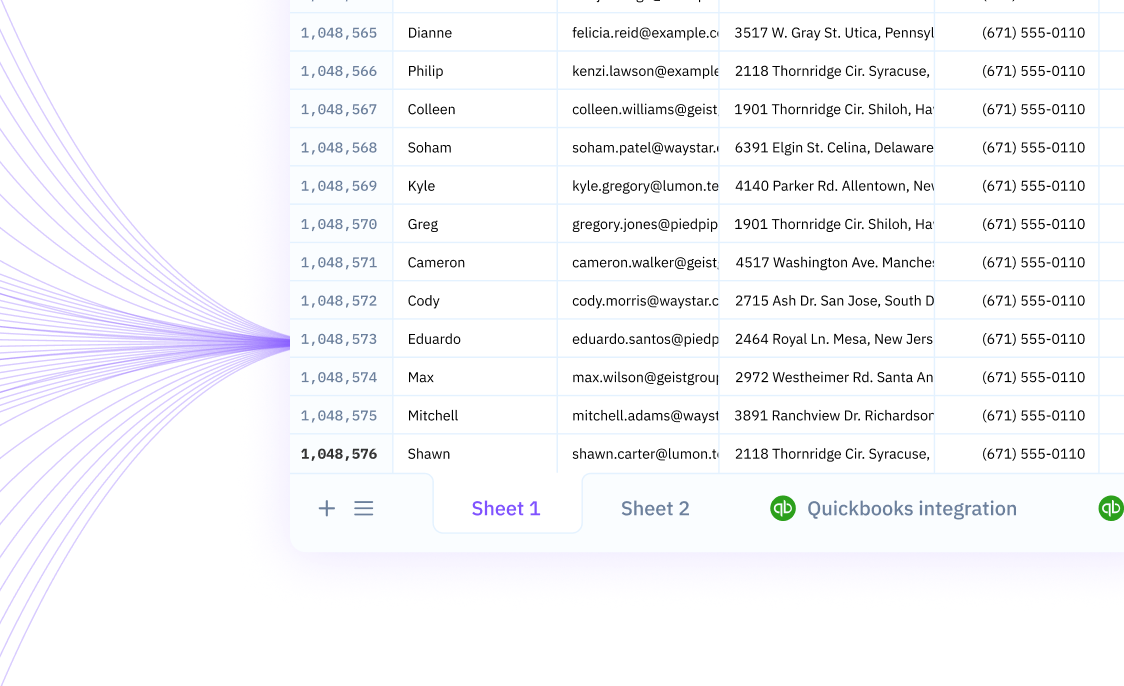
Export HSBC to CSV

Overview
Managing your HSBC transaction history efficiently is crucial for both personal finance tracking and business accounting. Exporting your transactions to a CSV (Comma-Separated Values) file enables you to download your history and analyze it in a spreadsheet, offering a flexible and straightforward way to monitor your finances over time. On this page, we will discuss what HSBC is, provide a step-by-step guide on how to export HSBC transactions to a CSV file, explore various use cases for doing so, and introduce Sourcetable as an alternative to traditional CSV exports for HSBC. Additionally, we'll address common questions and concerns about the export process to ensure you have all the necessary information at your fingertips.
What is HSBC?
HSBC is a global banking institution that provides a wide array of services catering to both personal and international banking needs. They offer standard personal banking services including checking and savings accounts, which are fundamental for daily financial management. In addition to these, HSBC provides credit card options to customers, facilitating various purchasing capabilities and potential financial flexibility.
Moreover, HSBC is involved in the housing market by offering mortgage and home loan products, catering to those seeking to purchase real estate. For individuals interested in planning for the future, HSBC provides investment services, annuities, and life insurance products, emphasizing its role in personal financial growth and security.
HSBC is also particularly recognized for its international services, which are designed to assist customers with the complexities of international banking. These services are essential for customers who engage in global financial transactions or require banking solutions that transcend national borders.
How to Export HSBC to a CSV File
Exporting on a Phone Using a Web Browser
You can export a CSV file from HSBC on your phone by accessing the HSBC website through your web browser. This process may require navigating the mobile version of the site and selecting the appropriate options to download your account information in CSV format.
Exporting on a Tablet, PC, or Laptop
Using a tablet, PC, or laptop to export a CSV file from HSBC is generally easier than using a phone. The larger screen and more robust interface can simplify the process of selecting the necessary options to export your account data in the desired CSV format.
Account Variations
Be aware that different types of HSBC accounts may have variations in how data is presented when exporting to a CSV file. It is important to review the exported data to ensure it meets your needs and reflects the correct account information.
After Downloading the CSV File
Once the CSV file is downloaded and saved on your device, you have the option to email the file to yourself or others. Additionally, you can upload the CSV file to a document portal within the HSBC app, if such a feature is available.
Import HSBC Data Directly into Sourcetable
Using Sourcetable offers a seamless and more efficient alternative to the traditional method of exporting HSBC data to a CSV file and then importing it into another spreadsheet program. With Sourcetable, you can sync your live HSBC data directly into a dynamic spreadsheet environment. This eliminates the need for multiple steps and significantly reduces the risk of errors that can occur during the data transfer process.
Moreover, Sourcetable is designed to simplify the integration of data from various sources. It allows you to automatically pull in your financial data from HSBC, enabling real-time data analysis and decision-making. The intuitive spreadsheet interface of Sourcetable makes it accessible for users accustomed to traditional spreadsheet programs while providing powerful automation and business intelligence capabilities.
By choosing Sourcetable over the conventional CSV export and import method, you stand to gain from enhanced data accuracy, real-time insights, and a significant reduction in manual data handling. This can lead to improved productivity and a more streamlined workflow for your financial data management tasks.
Common Use Cases
-
Personal finance managementH
-
Transaction history archivingH
-
Expense tracking and analysisH
-
Budgeting and financial planningH
-
Tax preparation and reportingH
Frequently Asked Questions
What changed with HSBC's business banking in January?
HSBC changed their business banking by altering the format of the .CSV file for current accounts.
Can I still upload the new .CSV file format for current accounts to Quickfile?
Yes, you can use the 'Other' upload file option to manually map fields for current account uploads as Quickfile has updated the mapping to fully support the new format.
Does the new .CSV file format from HSBC work for credit card account uploads?
The .CSV file for current accounts still works for credit card account uploads without any modifications.
How many columns does the newly downloaded HSBC .CSV file have?
The newly downloaded HSBC .CSV file only has one column.
What should I do if the pre-mapped 'HSBC' file option in Upload Banking Data no longer matches the new .CSV format?
You should use the 'Other' option when selecting the bank to manually map the columns in Quickfile.
Conclusion
With the ability to create a CSV file from an HSBC account page for any 12-month period in the last 6 years, the now-unmaintained HSBC to CSV extension may still serve as a useful tool for some, and is available for download on GitHub. However, HSBC now offers CSV file generation on their website, simplifying the process of exporting your transactions. After obtaining your CSV, it can be easily uploaded to various applications, such as the NJB Taxback app. For those seeking to streamline their financial data management further, Sourcetable offers a seamless solution to import your data directly into a spreadsheet, bypassing the need for manual CSV export and conversion. To enhance your accounting workflow and efficiency, sign up for Sourcetable to get started.


